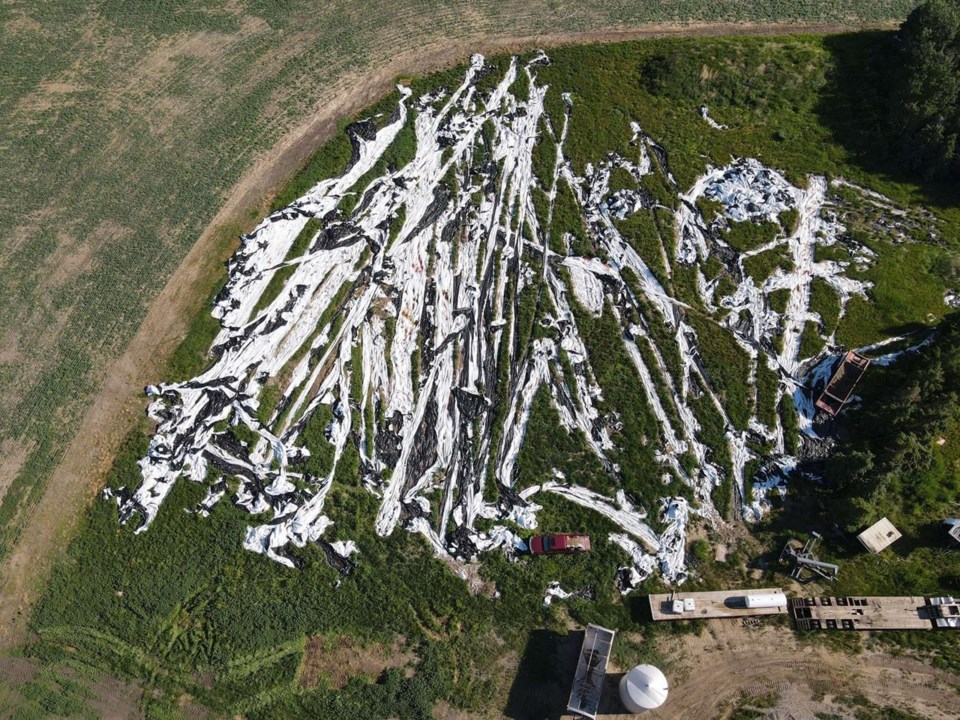YORKTON — Dallon Leger thought he was part of the solution.
The entrepreneur from Yorkton says he collected more than 1.8 million kilograms of used grain bags over the past few years, helping his neighbours deal with their mounting plastic problem.
Leger’s business, EcoGenX, transported the grain bags to a company in the United States that would recycle them. The company would turn the bags into various agricultural plastic products, including new grain bags. EcoGenX would then sell the recycled product in Saskatchewan.
But he says the Saskatchewan government has stifled his business through rules he believes are unfair.
The province recently took Leger to court and won, fining him for not following the province’s grain bag regulations. It effectively forced him to close his business.
“I’m not perfect, no entrepreneur is, but my government was my biggest hurdle,” said Leger, a farm worker, in an interview earlier this month. “That should never have happened, not when climate change and environment as a whole is the hot topic right now.”
Leger pleaded guilty in late April for failing to comply with the government’s Agricultural Packaging Waste Stewardship Regulations, therefore violating a section of Saskatchewan’s Environment and Management Protection Act.
Court determined he did not operate a product stewardship program that was approved by the environment minister. He was fined $580 and must pay $10,604 to Cleanfarms, a regulated non-profit that also collects grain bags in the province.
Leger explained his lawyer advised him to plead guilty because it wouldn’t have been a winning fight.
However, he said the province’s position is still not right.
“How can you charge me under the environmental act, find me guilty of anything, when I did no harm to the environment? That says a lot,” he said. “I felt I did something good."
The Saskatchewan government regulates the industry, requiring grain bag sellers to participate in an approved product stewardship program.
EcoGenX didn’t operate under an approved program.
Environment Minister Dana Skoropad said the legislation is meant to ensure agricultural plastics recycling is sustainable in Saskatchewan.
“The community of sellers of these products is quite small in Saskatchewan, so it’s certainly important that all first sellers be compliant with the regulations and a level playing field be existent,” Skoropad said. “And that ensures the financial stability and sustainability of the program.”
Cleanfarms is the only approved product stewardship program in Saskatchewan, which means grain bag sellers must work with Cleanfarms or get their own program rubber-stamped if they want to participate.
Under the Cleanfarms program, farmers can deliver bags to more than 40 collection points set up by the organization.
Sellers collect an environment handling fee when they sell the bags. The sellers then remit those fees to Cleanfarms so the organization can operate its collection sites.
Leger didn’t remit environmental handling fees to Cleanfarms when he sold bags, arguing he didn’t need to because his company did all the work in partnership with the American recycler.
“I would travel anywhere in the province, roll up their bags. I would do all the work,” he said. “I had the best answer for this fairly large problem -- like it’s a significant amount of plastic.”
The $10,604 Leger is required to pay to Cleanfarms represents the environmental handling fees he was supposed to pay to the organization.
Skoropad said he’s open to working with anyone who would meet the requirements in the legislation.
He said Leger did not submit a proposal.
However, Leger said he tried to work with the provincial government but was told the province was not interested in another operator.
“I’m told, ‘We have to focus on the sustainability of the current approved program,'" he said. “Well, I’m sorry I’m a threat to this non-profit organization. That’s kind of what a business is meant to do, is grow and succeed.”
Leger accused the government of siding with Cleanfarms, pointing to past lobbying by CropLife Canada, a sister organization of Cleanfarms.
In 2016, CropLife representatives lobbied Saskatchewan ministers about “promoting the benefits of industry stewardship programs.” It noted Cleanfarms had been active in the province.
CropLife, which is based in Ontario, lobbied former environment minister Scott Moe, who’s now premier, and former agriculture minister Lyle Stewart. Ted Menzies, CropLife’s former president, was among those lobbying. Menzies had previously served as a Conservative MP and cabinet minister before moving to CropLife.
In 2018, the province’s Agricultural Packaging Waste Stewardship Regulations came into effect.
“I believe this created a monopoly and gives an out-of-province organization 100 per cent of the money that Saskatchewan farmers pay,” Leger said.
Skorpopad denied the accusations.
“Cleanfarms submitted an application to be a product stewardship operator and that would be the extent of my knowledge of that,” he said. “As I said before, we’re open to working with anyone who would meet the requirements of the regulations on this program.”
Skoropad said he doesn’t know if there have been previous applications to become an operator. He said there are 14 regulated grain bag sellers in Saskatchewan.
Leger said he has plans to continue fighting his case.
“I was demonized, so to me that’s worth continuing to fight for and why I didn’t give up."
This report by The Canadian Press was first published May 28, 2023.
Jeremy Simes, The Canadian Press




